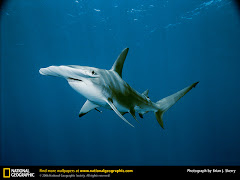
Let's just start the year off right with
Carcharodon carcharias!
White Sharks (Great Whites) are large, with long spindle-shaped bodies and a large dorsal fin. The top of the body is a dark grey colour and the underside is white; there is a sharp colour change. The colouring allows for camouflage from prey or predators that may view the shark above or below it.
At birth, they are 110-160 cm long (3-5 ft). Females are generally larger at 450-500 cm (11-13 ft) and males average a 350-400 cm (14-16 ft) total length. Maximum length is approximately 600 cm (20 ft).
Distribution & Habitat:White Sharks have a wide-ranging distribution throughout most of the world's oceans. They inhabit a wide variety of habitats: from shallow waters to open ocean (depths up to 1300 m) to rocky reefs and oceanic islands. They are a highly migratory species, easily crossing oceans. Satellite studies are starting to reveal their migratory paths (similar to migratory fly-over paths of birds).
Behavioural studies are also revealing complex social behaviours, intelligence, and curiosity. They are well known for breaching the water while hunting for prey, particularly seals, in South Africa and Australia.
Biology:White sharks have the ability to maintain an internal body temperature higher than the surrounding water, which effectively makes them endothermic. Endothermic means animals generate heat in order to maintain a stable internal body temperature. This adaptation allows White Sharks to swim quickly and hunt in cold water. Prey sources include small fishes when juvenile to large marine mammals.
Reproduction:Internal fertilization. Gestation period is approximately 12 months; litters of 2-10 pups is common. Birthing cycles are in 2-3 year intervals, so they do not have litters every year. White sharks are live-bearers, which means that the pups are birthed. The pups are fully formed at birth and do not require care from the mother (parental care). They swim off right after birth to search for prey.
Conservation Status & Issues:Listed as Vulnerable on the IUCN Red List. Populations are depleted through commercial fishing bycatch, finning, and declining prey sources. Most shark species are depleted. Protected by the U.S., Canada, Australia, and New Zealand. Also protected from international trade through
CITES.
Please see the
Monterey Bay Aquarium for their extensive research on juvenile White Sharks!
Compagno, Leonard, Marc Dando, and Sarah Fowler. Sharks of the World. Princeton Field Guides. Princeton University Press: Princeton, New Jersey. 2005.


